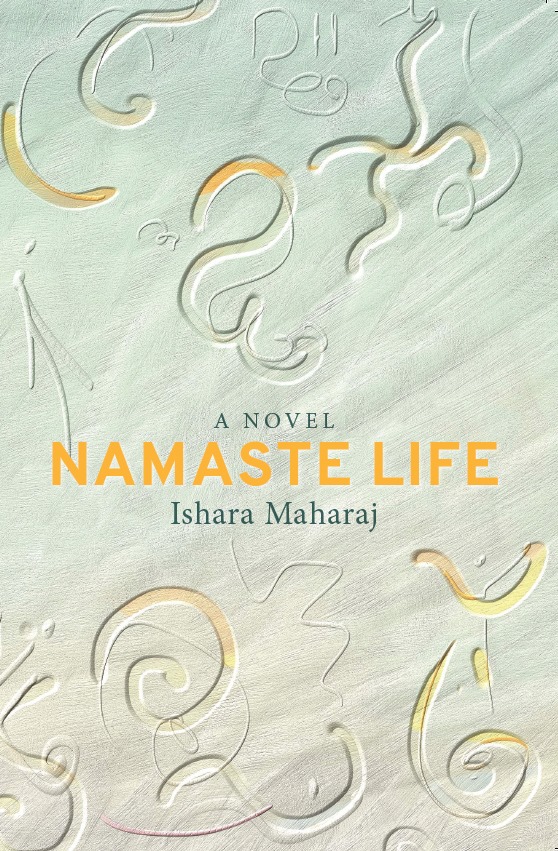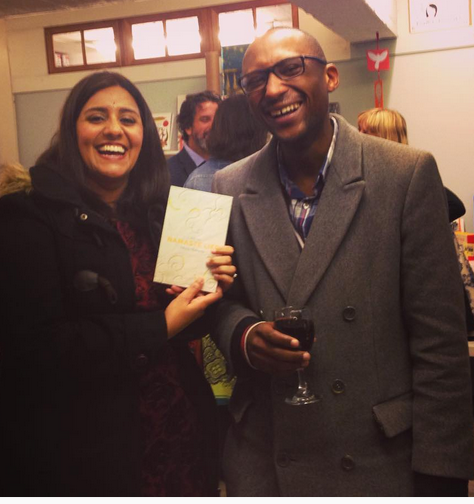Ishara Maharaj completed the Write a Novel Course at SA Writers College. Since then her debut novel Namaste Life (Modjaji Books) was published. We ask Ishara about her writing journey that led to her success.
Q: Ishara, you had previously written a non-fiction book, but Namaste Life is your debut novel. Can you describe the process you went through to find a publisher?
A: As a novel for young adults, particularly for female readers, I looked at various publishers and tried to find a match in terms of a publishing house that would be likely to select my novel as part of their list of titles. I then paid very close attention to their submission requirements, as each one was different.
Some writers suggest that you simultaneously submit your manuscript to several publishing houses, but I chose to apply to one at a time. I was lucky to find Modjaji Books – a small publishing house especially for Southern African women writers. This was my third try with a publishing house and I guess it was third time lucky for me!
Q: What sparked the idea for your novel, and where did you find the inspiration for the main characters and plot?
The storyline for Namaste Life stewed in my head for several years until I decided to give it more attention. This was when I decided to enrol on the Write a Novel Course at SA Writers College. Through the course, the characters developed into full-blown people in my head and on paper.
I was inspired to write this particular story based on my own experiences as a young South African Indian girl growing up in a staunch Hindu community and then going off to university and learning to become the adult that I am today. Of course, the story line was fabricated beyond my personal experiences, but the memories of being a student at university were pulled through into my main characters.
The issue of sexual assault and victim-blaming was, and still is very relevant in South African society, and I felt the need to write about it to encourage young girls and their parents or teachers to have discussions about how to deal with sexual assault.
I would feel that my book has made a difference to my community if it can facilitate discussions about helping a victim of rape to heal. There is also an element of magic realism in the novel which I felt had to be included to give readers a peak into the world of Hindu mythology and dream interpretation, without becoming too preachy or prescriptive about religious beliefs.
I’ve grown up with dreams foretelling good and bad fortune and it is part of Hindu culture just as much as it is a part of other African cultures. Beliefs about Hindu mythology, karma and life between lives have always fascinated me.
Q: Writing a novel can be an arduous journey. Do you have any tips for other writers? Any special habits that worked well for you?
A: I was super-excited when I ended the Novel Writing Course with the first draft of a full manuscript, and I was so eager to get it out to publishers. But I was forced to put my writing aside with the birth of my daughter, and this was actually a blessing in disguise. When I re-read my first manuscript months later, I read with a fresh mind, and ended up re-writing a few parts.
So my advice to other writers would be to first accept that the book-writing and publishing process is a long one. Give yourself time to leave your manuscript alone and come back to it after a good break. You will find ways to improve your story.
The other really important piece of advice I’d like to give to all writers is to take your ego out of the writing and editing process once you do have a publisher and editor. Many of us cradle our works of fiction as if we are caring for our beloved children, so when an editor gives us a reality check in the form of valid, and sometimes harsh criticism, we react rather emotionally.
It takes some practice to get your emotions out of the way of writing a good story, but it does make for a better final product.
The last piece of advice I’d like to add is to know when to let go of your writing at some point when you’ve edited and re-written for many months. As a writer who has now published, I can admit that I could continue editing the novel that was just released, but at some point, I had to stop myself!
Q: Did you ever feel like giving up along the way? What kept you going?
A: I had a particularly long gestation period – almost two years from signing the publishing contract – with my publisher for various reasons, so it was frustrating for me as my life had moved on in a sense since I wrote the novel.
I just wanted the novel to be ready for launch day, and had to find a well of strength to remain patient. To get over my frustration, I continued with other aspects of my life – I am involved in creating my first start-up organisation through a technology incubator. Keeping busy in other areas of my life certainly helped me to deal with the long wait.

Q: Many students at The Writers College are just starting out with writing their first novel. What advice would you give them about entering the publishing world?
My tutor Alex once said to me that it is harder to get published than to write a novel. I think I was lucky to have my manuscript accepted by the third publisher I tried.
The first time you receive a rejection letter is very disappointing, but don’t give up. You are usually given some advice about why your manuscript was not accepted and you should bear that in mind when you submit to the next publishing house.
When you do eventually get a publishing contract, be prepared to do some re-writing and to defend the parts of your manuscript that make your writing unique. At the same time, listen to the advice of your editors and proof-readers – they have been doing their work a lot longer than you have and therefore have more industry experience. They are simply trying to get your manuscript ship-shape for readers to actually want to buy your book.
Q: What is the best piece of writing advice you received as a writer?
Never forget why you write or why you tell a story the way only you do. Find your unique writing voice and the passion that exists within that voice that keeps you coming back to your notebook or tablet to create more.
The one thing that sticks with me from the How to Write a Novel course is: Show, don’t tell! This is probably one of the most vital pieces of instruction for a writer of fiction.
Lastly, my wonderful tutor Alex Smith left me with this quote when I ended the course, and I’ve written it out and stuck it on my wall. It still provides me with inspiration and reminds me that there is a bit of crazy in me to make my writing journey a reality.
“To sum it all up, if you want to write, if you want to create, you must be the most sublime fool that God ever turned out and sent rambling. You must write every single day of your life. You must write dreadful dumb books and glorious books, and let them wrestle in beautiful fights inside your head, vulgar one moment, brilliant the next. You must lurk in libraries and climb the stacks like ladders to sniff books like perfume and wear books like hats upon your crazy heads. I wish craziness and foolishness and madness upon you. May you live with hysteria, and out of it make fine stories – science fiction, or otherwise. And out of that love, remake a world.” ~ Ray Bradbury, science fiction & fantasy author












